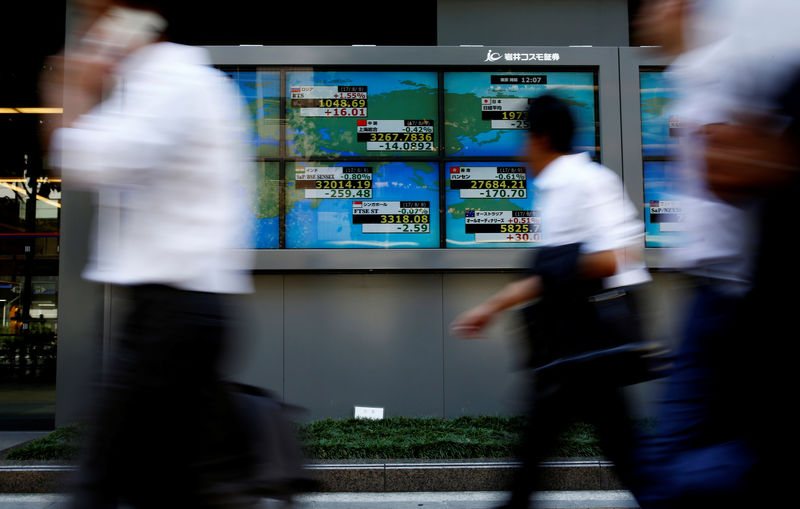By Sujata Rao
LONDON (Reuters) - Global equities rallied for a second straight day on Wednesday while safe-haven assets such as U.S. bonds and the Japanese yen slipped to multi-week lows as investors bet the escalating U.S.-China trade spat would inflict less damage than feared.
The deepening tariff row between the United States and China threatens to disrupt supply chains and undermine the world economy.
But markets appear to have taken cheer from China's move to levy only 10 percent duty on $60 billion of U.S. imports. Washington removed some 300 Chinese-made items from the list of dutiable goods.
World growth is undoubtedly at risk -- a survey by ThomsonReuters and INSEAD showed confidence among Asian companies at the weakest in almost three years as businesses feared blowback from the trade war
Dutch bank ING estimates 2.5 percent of world trade is now affected by tariffs, rising to 4 percent should U.S. President Donald Trump slap levies on all Chinese imports.
But hopes of Chinese stimulus to counter the impact on the economy, as well as a pledge by premier Li Keqiang to not use yuan devaluation as a tool in the trade war, reassured investors to some extent, allowing markets to build on Tuesday's gains.
MSCI's index of global equities rose 0.2 percent to a two-week high while emerging stocks too firmed for a second day, led by a one percent jump in Shanghai markets.An index of non-Japan Asian stocks also rose one percent <
Government bonds from the United States and Germany, typically instruments that benefit from political or economic turmoil, saw yields race to multi-week highs. U.S. 10-year yields stayed firmly above the key 3 percent mark.
"Where we are today, is in a period of relative calm as U.S. bond yields probe their highs, and we become accustomed to trade rhetoric and perhaps, blasé about the economic damage it will cause," said Societe Generale (PA:SOGN) strategist Kit Juckes
"All things considered, though, the tariff spat could have been a lot worse. Investors reacted relatively well to the news."
European share markets followed Asian counterparts higher and U.S. equity futures were modestly higher after Wall Street's bounce on Tuesday (N).
Analysts noted that U.S. Treasury Secretary Steven Mnuchin last week had invited Beijing to a new round of talks but some also reckon on a more conciliatory stance from China.
"China are out of bullets. The fight is done and dusted. Now it's just a question of how the Chinese can save face and say 'alright we're going to change, going to open up wider access not only to the U.S. but to the EU and Japan', said Christopher Peel, chief investment officer at Tavistock Wealth in London.
"Their economy is export-led, they can't afford for it to go out of control."
But for now, the yuan was lifted by Premier Keqiang's pledge, up 0.15 percent at 6.8504 per dollar, allowing an index of emerging currencies to rise to its highest since last Friday.
The dollar continued to lose ground, slipping 0.3 percent to stay near seven-week lows against a basket of currencies
In another sign of markets' new-found optimism, the safe-haven yen slipped to two-month lows against the dollar. The Bank of Japan kept policy unchanged as expected.
The British pound was volatile, rising half a percent to an nine-week high of $1.3215 after data showed inflation hitting a six month high while 10-year British government bond yields rose to the highest since February.
U.S. and German bond yields also rose. German yields surpassed 0.5 percent for the first time since mid-June, lifted by the equity rally and signs of calm on markets in Italy, where the coalition government is now widely expected to deliver a budget that respects EU fiscal discipline rules.

(reporting by Sujata Rao; Additional reporting by Shinichi Saoshiro in Tokyo; Tom Finn in London; Editing by Jon Boyle)